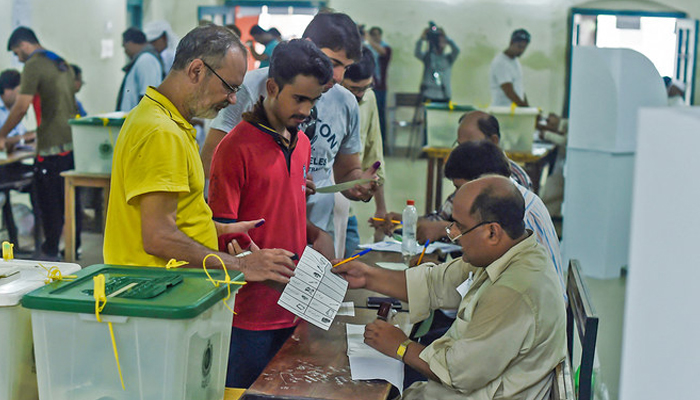Defence ministry files plea in SC seeking polls on same day
Ministry's petition calls for holding countrywide election after completion of NA, provincial assemblies' tenure
ISLAMABAD: The defence ministry — responsible for allocating armed forces for elections — has filed a petition in the Supreme Court requesting polls in the country on the same date.
The ministry's view is in line with the federal government's stance, which has persistently opposed holding separate general elections in Punjab and Khyber Pakhtunkhwa (KP).
The tenure of the National Assembly and the legislature of two other provinces — Sindh and Balochistan — will end later this year and the federal government wants the polls to take place then, not in May, as directed by the Supreme Court on April 4.
"...the instant application may be granted, the order dated 04-04-2023 passed in C.P. No. 5/2023 may kindly be recalled with the directions that the general elections to the National and all Provincial Assemblies be held together, upon completion of the term of the National and the other two Provincial Assemblies i.e. of Sindh and Balochistan," the ministry's plea, filed on Tuesday, stated.
In the April 4 order, the top court ruled that the Election Commission of Pakistan’s (ECP) decision to postpone polls to the Punjab Assembly till October 8 was “unconstitutional” and fixed May 14 as the date for polls in Punjab.
“The impugned order dated 22.03.2023 made by the Election Commission of Pakistan is declared to be unconstitutional, without lawful authority or jurisdiction, void ab-initio, of no legal effect and is hereby quashed,” the ruling said. “Neither the Constitution nor the law empowers the Commission to extend the date of elections beyond the 90 days period as provided in Article 224(2) of the Constitution.”
The ECP on March 22 announced that the elections in Punjab would be held on October 8. The date was earlier set on April 30, in consultation with President Arif Alvi, but was later extended in view of the security situation and the non-provision of funds from the government.
But despite the court's orders, the government did not budge and got a resolution passed through parliament against the verdict, clearly stating that it would not provide funds to the ECP for polls.
Following the government's move, the apex court directed the State Bank of Pakistan (SBP) to release a total of Rs21 billion to the election commission for holding polls, but even after the deadline passed on April 17, the central bank did not release the funds.
In a session of the National Assembly's Standing Committee on Finance and Revenue a day earlier, SBP Acting Governor Sima Kamil said the central bank had allocated funds — on the SC's orders — for the polls but lacked the authority to release them.
In a report filed in the top court earlier today, the ECP said the conduct of election on May 14 is getting impossible due to the non-provision of funds and security forces for maintaining law and order.
Interior Minister Rana Sanaullah asserted last week that elections to the Punjab Assembly would not be held on May 14 despite "all-out efforts" of the opposition Pakistan Tehreek-e-Insaf (PTI).
In response, PTI Senior Vice President Fawad Chaudhry had demanded the Supreme Court initiate contempt proceedings against Prime Minister Shehbaz Sharif and the federal cabinet for not releasing funds to the ECP for polls.
The PTI had dissolved both assemblies in January in a bid to force the government into holding elections across the board, but the Shehbaz-led administration did not give in to the demand.
With both sides at an impasse, Jamaat-e-Islami approached them with a proposal for talks, and the PTI formed a three-member committee to negotiate with the government. However, there is a divide among the ruling allies on holding talks with the opposition.
-
Security forces gun down 30 terrorists in multiple IBOs in KP: ISPR
-
MQM-P calls for new province in Sindh
-
US report validates Pakistan military edge over India: PM
-
Banned TTP poses serious threat to Pakistan security: UNSC panel
-
CM Afridi clarifies remarks on by-poll after ECP requests army deployment
-
Dubai sees 3.2m Pakistani passengers in 2025 as airport sets new milestone
-
Security forces kill 23 Indian proxy terrorists in KP's Kurram
-
Pakistan to construct island to boost oil exploration: report












